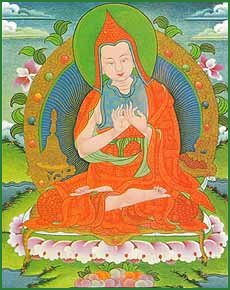The Great Chariot
by Longchenpa | 268,580 words
A Commentary on Great Perfection: The Nature of Mind, Easer of Weariness In Sanskrit the title is ‘Mahāsandhi-cittā-visranta-vṛtti-mahāratha-nāma’. In Tibetan ‘rDzogs pa chen po sems nyid ngal gso’i shing rta chen po shes bya ba ’...
3c) The animal realm
1) The way they suffer
Now there is the teaching that animals too are without happiness:
In the animal realm, those who live within the four oceans
All devour each other, in measureless suffering.
Even hiding in the seas, in the darkness between the continents,
They fear heat and cold, and hunger and thirst, and being eaten.Scattered beasts and birds throughout the human realm
Are in danger chiefly from hunters, and also from each other.Horses, oxen, camels, as well as donkeys and such,
Have limitless pains of carrying burdens and being beaten.
Though they are killed for their skins, and for their meat and bones.
They cannot see the limitless suffering of their nature.Nagas[1] suffer the pain and pleasure of noon and midnight.
As well as the pains and pleasures of coming day and night.
In some places there fall rains of abrasive, burning sand.
In some they are forsaken, alone without companions.
Mostly stupid, they fear such things as soaring birds.
They meet with a great variety of sufferings.
Though their uncertain lives are sometimes just a day.
Divine Takasaka and others are said to live a kalpa.
As for the animals living in their realm, the expanses of the great outer oceans between the four continents are filled without gaps with fish, conches, crocodiles, and the like, living there crawling as thick as the grain extracted for beer. The big ones eat the little ones, the little ones eat still littler ones, and so forth.
Beyond this continent’s iron mountains and also beyond those of the others, between their edges in the small spaces where they are side by side, is the darkness between the continents, so-called because the sun and moon do not shine there. In the waters there also they eat each other and have immeasurable sufferings of hunger, thirst and so forth.
The scattered animals on the face of the world, living in the human realm's mountains, plains, water, rocks, sky, and so forth, small creatures, worms, insects, birds, wild animals, and so forth, each have their particular sufferings of heat, cold, hunger, thirst, being eaten by each other, and so forth-- measureless illness and affliction. In particular they are tormented by hunters, fishermen, and birds of prey. Some die for their flesh, skins, and bones, or are exploited, beaten and bleeding, and then killed at the end of their labors, and have limitless other sufferings.
In the serpent realm too though there are appropriate pleasures of day and night, or morning and evening, there are also the many particular sufferings of hot and cold, hunger and thirst, and so forth.
Where some live rains of hot sand fall, and some are forsaken by any at all. Since it does not occur there, they are alone and companionless. In general they are stupid and afraid of birds, vidya mantra, and immeasurable other harmful phenomena. Their lives are uncertain. Some live only an instant, a day, and so forth. The kings of nagas, like Takasaka, live for an intermediate kalpa. The Abhidharmakosha says:
That of Takasaka is a kalpa.
The Sutra Requested by Ocean[2]says:
He lives in the ocean for an intermediate kalpa.
The Friendly Letter says:
Those who live within the animal realm are killed
With various sufferings of bondage and of beating.
These who are pacified and have abandoned virtue
Eat each other in a very terrible way.Some die for their pearls or fleece and some for their bones and blood.
Others also die for the sake of their meat and hides.
Others of them are worked and driven helplessly
With kicking feet and hands, with whips and hooks and so forth.
2) The instruction to be diligent in the Dharma:
Having thought about this, those who want liberation
From the world of animals, to benefit themselves,
Should embark on the path to the higher realms and the good and true
Striving day and night to maintain themselves in goodness.
For these reasons, those desiring liberation from being among those who have gone astray among the animals, from the good dharmas of virtue and so forth, should strive with this opportunity of the great path of gods and humans consisting of the ten virtues that accord with merit, the four dhyanas, and the four formless attainments. This is the instruction of the ultimate great path of liberation through the accumulations of merit and wisdom. Its essence is emptiness and compassion. Strive to meditate on that path by the six perfections and so forth.
Footnotes and references:
[1]:
[2]:
